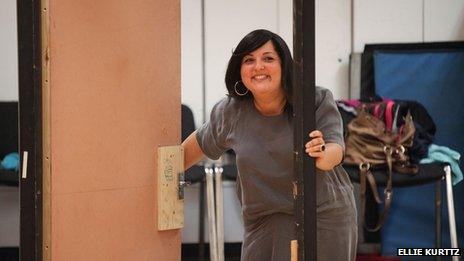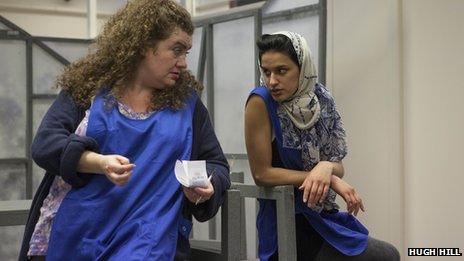Home at National Theatre shines light on homelessness
- Published

A cast of eight play 13 characters in the play Home, set in a fictional east London hostel
Home, a new play by Nadia Fall, seeks to expose theatregoers to the tough reality of young homeless people in east London, as told in their own words
"If I thought I'd had a hard day, they certainly put it in perspective for me," says director Nadia Fall at the premiere of Home, her new play at the National Theatre in London.
The play uses verbatim testimony from the residents of an east London shelter, extracted from hundreds of hours of interviews carried out by Fall.
The play mixes their words with music and even sounds, courtesy of female beatboxer Grace Savage.
It seems almost fitting that Home is being staged in the Shed, the NT's temporary wooden venue on the South Bank, such is the transitory experience of the young people whose hopes and fears are revealed through powerful, occasionally disturbing and often funny testimony.
With the number of rough sleepers in London increasing in 2012 by 13% to nearly 6,500, there are a lot of stories to be told.
"That's one of my biggest regrets that I couldn't tell all the stories," admits Fall. "Logistically I had to just tell a few and, I hope, do justice to big problems in housing and poverty."
'Pure verbatim'
Home follows in the footsteps of similar pieces of verbatim theatre such as Nemesis, which was staged by young people, external and explored terrorism and global politics; and The Riots, which opened to acclaim at the Tricycle Theatre and used the testimony of politicians, police, victims and rioters in the wake of the English summer riots of 2011 .
As with any piece of theatre based on one-to-one interviews, Fall reveals the challenge was getting the real-life residents of the unnamed hostel, renamed in Home as Target East, to open up about themselves.
"Some did want to talk, some were more shy and there were some people, probably the majority, who didn't want to talk and we tried to represent them through Jade - the beatboxing character - who didn't want to do an interview."
Fall admits that, for the purposes of drama, some artistic licence is taken, though points out that "about 85% of what is heard is pure verbatim".

Fall previously directed Hymn and The Doctor's Dilemma at the National
"There's artistic licence in the music and the staging - it is a creative process - but my own responsibility is to what I see as the truth of the situation," she adds.
More than 13 characters are portrayed by the half dozen or so actors and show the breadth of people who have become homeless for one reason or another.
A young teenager kicked out by his abusive stepfather, a Bangladeshi girl escaping a violent relationship, a former gang member and a young man with mental health issues are among the lost souls.
Plastered on the walls around the minimal set are reminders of the dangers facing those who find themselves on the streets. Posters about the risks of STIs compete for space with pictures of drug dealers who have been barred from the premises.
But there are also posters advertising football teams, singing clubs and educational courses.
During the days and weeks that followed the riots of 2011, young people were demonised in the press, particularly those from poorer backgrounds. Fall sees Home as a way of rebalancing those perceptions.
"What I found really shocking is that I expected people to be plaintive or complaining about their lot but actually 80% of the time the young people were full of spirit, full of positivity and ambition.
"Young people get such a hard rap nowadays, that they're dangerous or feral or not civilised and actually they're full of hope and redemption."
Cardboard Citizens
Home echoes the work that is already being done by the group Cardboard Citizens, external. Formed more than 20 years ago, the company is named after the huge cardboard city which existed underneath Waterloo Bridge in London before it was eventually closed in 1989.
The South Bank's Imax cinema now sits on the former site, itself a stone's throw away from the National Theatre
Terry O'Deary has acted in and directed Cardboard Citizens productions for the past eight years.
"We've just finished a piece called Glasshouse by Kate Tempest which we're hoping to tour nationally," she explains.

Cardboard Citizens' latest play was written by award-winning poet Kate Tempest
"We take that into hostels and day centres and it's a piece of theatre that's designed to get into those hard-to-reach places.
"Afterwards, because all of our actors have had some experience of homelessness, we make contact with people and invite them to take part in workshops and just get creative and start thinking about what they would like to do because they can be sitting around in hostels for years before they get offered anywhere."
Cardboard Citizens gets most of its money from Arts Council England but also secures funds from various charitable trusts and foundations and through fund-raising.
O'Deary says rising homelessness and cuts to housing benefits means it is more important than ever that these stories are told.
"We're dealing with this misinformation about homelessness about people who are on the lowest rungs of the ladder, that they're skivers or dodgers. People ask, 'What did you do to become homeless?' and it isn't the case."
Home doesn't just offer testimony from the residents of the shelter, interviews were also carried out with key workers and it is in their testimony that Home finds a harder political edge.
One, called Sharon for the purposes of the play, complains "the biggest issue is the deposit nowadays, you know, nobody's got a deposit to put down".
"Years ago," Fall adds, "you used to hear it all the time, you know, about young people getting pregnant just so as they get their council house. Now I see it all the time, these young people even when they are pregnant they don't get council housing like that, there is nothing available for them."
Changes to the benefit system and the rising cost of renting have raised concerns about more low-income families falling into arrears and Fall says the purpose of her work is not just to tell the stories but to make sure that the stories help influence government policy.
"I'm not afraid of using the world political - all theatre is political and thought-provoking and it should be, that's what theatre is," says Fall.
"I've just put the facts on the table, the facts of what people said and did and everybody else can come to their own conclusions but I won't hide behind the fact that I hope that there's direct impact from this play.
"I hope people think, I hope there's tangible policy change made from the raw data. I'm interested in changing society, not just rubbing my chin and thinking, 'Oh what a terrible world.'"
Home is in the Shed at the National Theatre until 7 September.
- Published20 June 2013
- Published6 April 2012
- Published23 November 2011